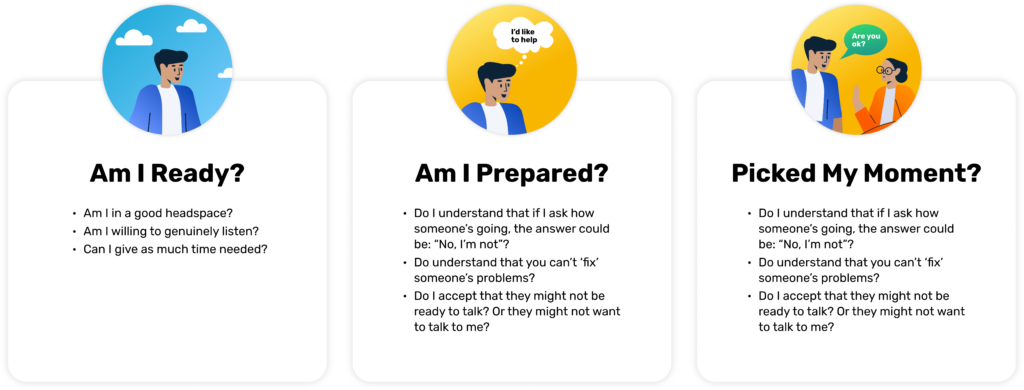How To Ask Are You Ok?
Got a feeling that someone you know or care about it isn’t behaving as they normally would? Perhaps they seem more agitated or withdrawn? Or they’re just not themselves. Trust that gut instinct and act on it. Learn more about how and when to ask Are You Ok?
By starting a conversation and commenting on the changes you’ve noticed, you could help that family member, friend or workmate open up. If they say they are not ok, you can follow our conversation steps below to show them they’re supported and help them find strategies to better manage the load. If they are ok, that person will know you’re someone who cares enough to ask.
Getting Ready To Ask
Before you can look out for others, you need to look out for yourself. And that’s ok. If you’re not in the right headspace or you don’t think you’re the right person to have the conversation, try to think of someone else in their support network who could talk to them.
To help you decide whether you’re ready to start a meaningful conversation, ask yourself:

Tips On How To Ask
1. Ask Are They Ok?
- Be relaxed, friendly and concerned in your approach.
- Help them open up by asking questions like “How are you going?” or “What’s been happening?”
- Mention specific things that have made you concerned for them, like “You seem less chatty than usual. How are you going?”
IF
- If they don’t want to talk, don’t criticise them.
- Tell them you’re still concerned about changes in their behaviour and you care about them.
- Avoid a confrontation.
- You could say: “Please call me if you ever want to chat” or “Is there someone else you’d rather talk to?”
2. Listen With An Open Mind
- Take what they say seriously and don’t interrupt or rush the conversation.
- Don’t judge their experiences or reactions but acknowledge that things seem tough for them.
- If they need time to think, sit patiently with the silence.
- Encourage them to explain: “How are you feeling about that?” or “How long have you felt that way?”
- Show that you’ve listened by repeating back what you’ve heard (in your own words) and ask if you have understood them properly.
3. Encourage Action
- Ask: “What have you done in the past to manage similar situations?”
- Ask: “How would you like me to support you?”
- Ask: “What’s something you can do for yourself right now? Something that’s enjoyable or relaxing?”
- You could say: “When I was going through a difficult time, I tried this… You might find it useful too.”
- If they’ve been feeling really down for more than 2 weeks, encourage them to see a health professional. You could say, “It might be useful to link in with someone who can support you. I’m happy to assist you to find the right person to talk to.”
- Be positive about the role of professionals in getting through tough times.
IF THEY NEED EXPERT HELP
Some conversations are too big for family and friends to take on alone. If someone’s been really low for more than 2 weeks – or is at risk – please contact a professional as soon as you can.
4. Check In
- Pop a reminder in your diary to call them in a couple of weeks. If they’re really struggling, follow up with them sooner.
- You could say: “I’ve been thinking of you and wanted to know how you’ve been going since we last chatted.”
- Ask if they’ve found a better way to manage the situation. If they haven’t done anything, don’t judge them. They might just need someone to listen to them for the moment.
- Stay in touch and be there for them. Genuine care and concern can make a real difference.
- Create and share a wheel with them on iyarn to use as a conversation canvas during your check ins, you can sign up to iyarn here.
WORRIED SOMEONE MIGHT BE SUICIDAL?
Contact Lifeline for crisis support. If life is in danger, call 000

This content was sourced from R U OK? To view more information about R U OK? click here.




